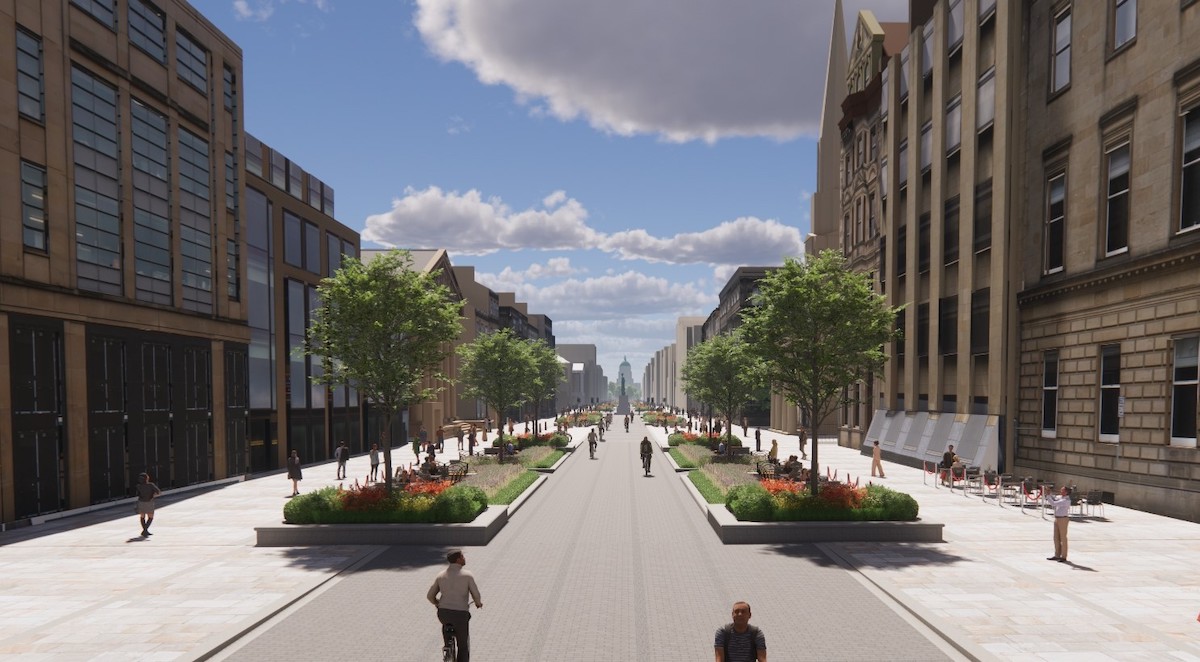Threat of legal action over banning of private hire vehicles from George Street
A taxi boss has suggested legal action could be taken against Edinburgh Council’s “ludicrous” plan to ban private hire vehicles from George Street once it is pedestrianised, while maintaining access for black cabs.
The £36 million project to turn the city centre thoroughfare into a ‘cycling street’ with wider pavements will introduce new traffic restrictions, although ‘permitted’ vehicles such as delivery and postal vans will be allowed to enter between 7pm and 10am.
Under the current proposals, that window will also apply to black cabs – but not pre-booked cars such as Ubers which make up the majority of the city’s taxis.
Council transport convener Cllr Scott Arthur said up to 5,000 taxis enter the street every day and that keeping this level of access would diminish the aims of the scheme.
However Kevin Woodburn, who runs the private hire firm Capital Cars, has called for “fair and equal treatment” of the trade’s two sectors, saying either both types of taxi should be permitted on George Street or neither should.
And speaking at the Transport Committee on Thursday, he hinted at a possible legal challenge against the council over the new rules.
“We fail to understand the reasoning and the logic,” he told councillors.
Mr Woodburn said two-thirds of the vehicles licensed by the council are private hire taxis, adding: “The majority of the vehicles who service the public are not allowed access while the minority are – it makes no sense to us.”
Describing the situation as “ludicrous,” he said there was “no data to back up why this decision has been taken”.
He said: “My concern is that we once again are being put in a position where we have no choice but to go down a legal route.”
A written deputation submitted by Mr Woodburn added: “We are probably having to look at legal recourse to eventually have a conversation about this and other potential plans, all at yet another horrendous expense to everyone involved, including the council tax paying public of Edinburgh.”
Cllr Arthur said the more traffic restrictions are relaxed, “the more of the value of what we’re trying to do is lost”.
He said: “Even allowing taxis in the evening, we think there would be about one a minute coming in.
“During peak times, we’ve got data that shows between 3,000 and 5,000 taxis come into George Street in a day.
“If we allowed that level of access, whilst it might be good for businesses, in the short-term we’d lose a lot of the value we’re trying to deliver on the street if 5,000 taxis come in in a single day.”
The George Street transformation is now set to commence in 2025 – a year later than previously anticipated.
It will create a ‘European style cycling street’ within the central carriageway, connecting the City Centre West East Link (CCWEL) cycle path and the future Meadows to George Street route.
Pavements will be widened to four metres with planters, shrubbery and relaxation spaces along the street. The latest designs also confirmed eight trees will be planted at either end.
Cllr Arthur said the project was “starting to get real” as it moved into the next phase which includes applying for the powers to begin construction and finalising plans.
However, concerns were raised at the meeting about the scheme’s £36 million price tag and the possibility of it rising further.
The council has already committed £15 million and a report said a further £10 million will have to be taken from the active travel budget, while additional external funding will also be sought.
Cllr Sanne Dijkstra-Downie said the Lib Dem group supported the objectives of the scheme but there remained “major concerns”.
She said: “Given the financial position that we as a council are in, is this scheme actually affordable? Do we know for sure that we want to spend potentially £25 million of council active travel money on this scheme and prioritise this over other spending?
“I’m uneasy about spending active travel funding which is desperately needed across our city in order to satisfy in-part very costly heritage concerns such as specific paving materials.
“I am deeply uncomfortable going forward at this stage with a plan that demands an additional £10 million – maybe more – without any sense of what schemes we would not be able to implement as a result.”
The Liberal Democrats called for the project to be shelved until there is greater clarity on the ‘uncertain’ funding situation, but the move was defeated in a vote.
by Donald Turvill, Local Democracy Reporter.
The Local Democracy Reporting Service (LDRS) is a public service news agency. It is funded by the BBC, provided by the local news sector (in Edinburgh that is Reach plc (the publisher behind Edinburgh Live and The Daily Record) and used by many qualifying partners. Local Democracy Reporters cover news about top-tier local authorities and other public service organisations.
